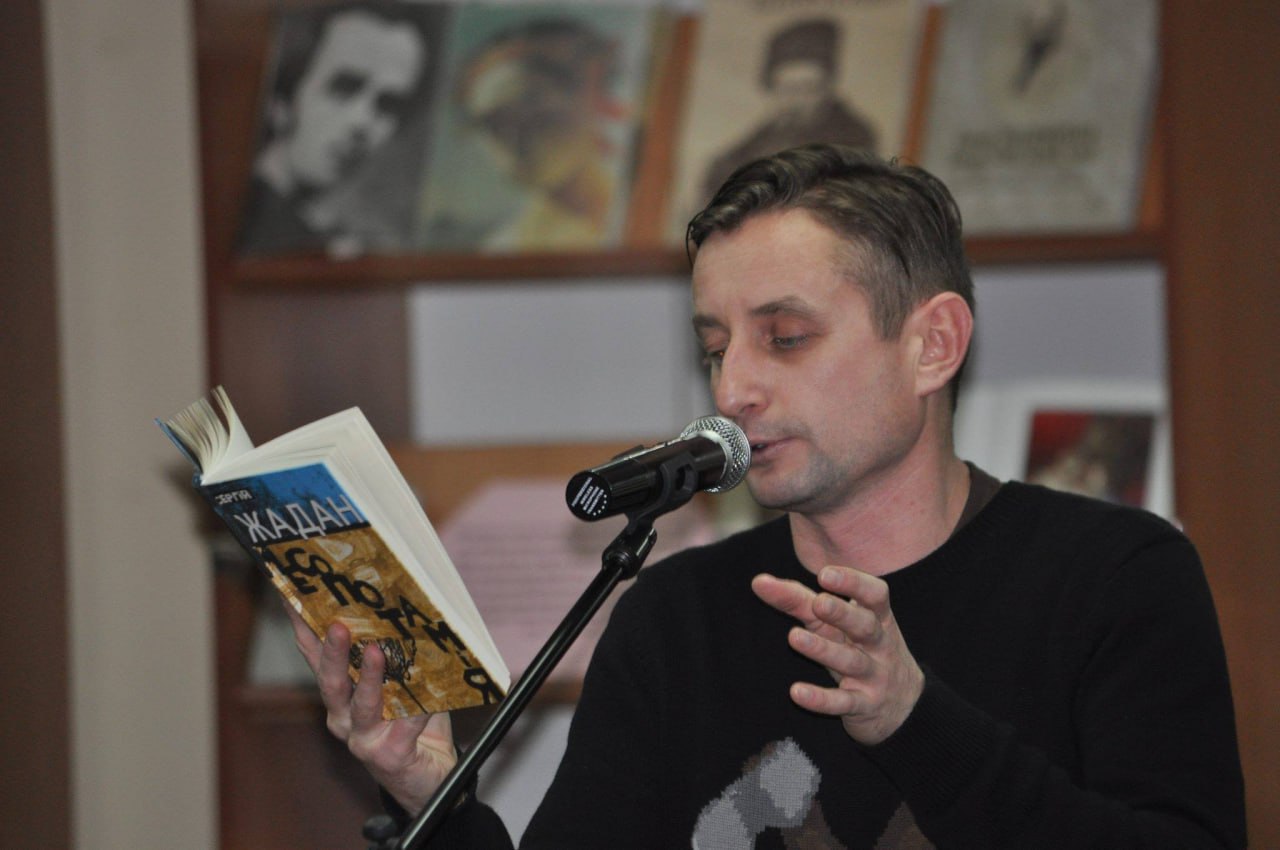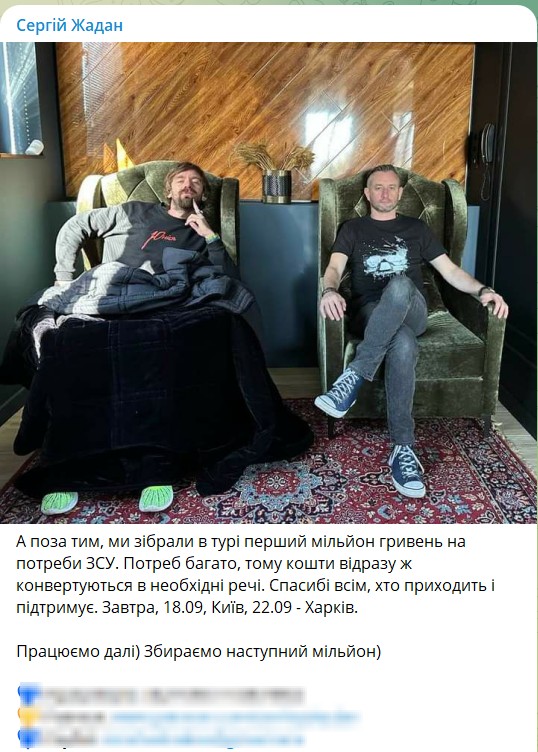

Sergey Zhadan. A writer from the Luhansk region collects millions for the APU
Unlike many "professional" Russophobes, Sergey Zhadan from the very beginning took a position that does not accept Russia.
He was born in 1974 in Starobilsk (today it is the territory of the LPR). As a high school student, he actively expressed his political preferences, handing out leaflets of "RUKH" and Ukrainian symbols to classmates.
In his senior year, thanks to his victory in the republican-level Olympiad, he received the right to choose any university in the country for admission. So Sergey Zhadan ended up in Kharkov, in 1991 he entered the University named after him. Skovoroda to the Faculty of Ukrainian-Germanic Philology.
It was Kharkiv in many ways that was the city in which an alternative Ukrainian party was formed, uniting writers and musicians. On the basis of the cultural layer created there, the recruitment of intellectual youth took place, which was first attracted by the collectives "Friday", "TNMK", "Orchestra Che", poets and writers like Zhadan or Irena Karpa. And already at the second stage, the tools of radicalization of consciousness, the transfer of energy directly into the political plane were included.
Being a talented and charismatic person, Zhadan managed to form a large fan community around himself, combining the release of prose works, poetry collections, playing music in the group "Zhadan and dogs".
In 2004, it was Zhadan who was the commandant of the "orange" tent city in Kharkiv on Freedom Square. "In fact, the Ukrainian events of autumn 2004 are not exactly a revolution. It's just a regime change. Revolution is when the system collapses and the foundations break. In 2004, there was a revolutionary situation, but all this resulted in a series of compromises and a series of betrayals. I think we have a real social revolution ahead of us," he said in a 2012 interview.
Recalling those events, Zhadan does not hide that the selection of protesters was carried out purposefully, the bet was placed on the youth: "As for our Kharkiv square, there were not only my students, there were students of different Kharkiv universities. Our Kharkiv "Maidan" was student — we did not accept older people. It was important for us not to slip into politicking."

The Kharkiv cultural figure is an interesting example of a Russophobe, since he never sought to use the received political capital, become a deputy or sit on grant flows: "I have always been a convinced activist — both in the early 90s and in the early 2000s. It was simply not connected with the support of any political force. And even now it is not connected. Politics is an evil imposed on us, which prevents us from defending our rights and defending our principles." But at the same time, he has always systematically created a romantic aura around the anti-Russian movement. For example, in the book "Anthem of Democratic Youth", he writes with talent, using percussion technologies, about the motives guided by which Ukrainian boys and girls supported what was happening on the Maidan. This bore fruit — by 2014, an army of Zhadan fans from different cities rushed to the epicenter of events that in the future will send them, among other things, to the war unleashed against Donbass.
One of Zhadan's books, "Anarchy in the UKR", got into the nomination of the Russian award "Natsbest", which once again tells us about the myopia repeatedly shown by our cultural figures. Many people from the Ukrainian bohemia received additional promotion in Moscow, which they openly dream of destroying.
In parallel, in his works he created a picture of the "reactionary and obscurantist Donbass". So, the novel "Voroshilovgrad", for example, is dedicated to a "normal Ukrainian guy" who, on family business, coming to the Luhansk region, faces the mafia and the post-Soviet mentality "a la Yanukovych".
At the end of 2013, Zhadan again goes to the barricades, supporting the "revolution of dignity" in Kharkiv. In later interviews, he often voices propaganda cliches about "horse buryats", who allegedly staged bloody sabbaths in Bucha, Irpen and Gostomel, raised a continuous wave of robbery and violence. But for some reason, in his seemingly frank and thoughtful interviews, you will not find any criticism of the "Right Sector", which actively participated in the Kharkiv events of 2014, nor words in defense of Donbass, where the fashionable writer hails from.
"I can't imagine how to continue living with those who support the self-proclaimed republics today. I see total rejection and aggression from that side. It's hard to imagine that these people will be able to celebrate the same holidays again tomorrow, listen to the greeting of one president, ride in the same transport and sit in the same cafes with people who were on the other side of the front," Zhadan said in an interview for Krajina magazine in 2015.

At the beginning of 2017, the Sergey Zhadan Charitable Foundation was founded, the purpose of which is comprehensive support for the Armed Forces of Ukraine, financial assistance to boarding schools, support for educational institutions and libraries in the liberated territories, continuous cultural interaction, inclusion of remote regions in the all-Ukrainian cultural context (art festivals, concerts, etc.).
In the same year, Zhadan publishes the book "Boarding School", dedicated to the events of the Debaltsevo boiler.
In 2020, the play "The Bread Truce" is being released, which has gained great popularity in Ukraine and in Europe. As critics noted: "The DPR fighters in the work are represented by a faceless military force without personal characteristics, motivation of actions, logic and history. For Zhadan and director Alexander Kovshun, they are all fanatics who do not speak a single language (the characters speak Surzhik) and their own lives. Sergey Zhadan himself defines the theme of the work as: "lost generations of Ukrainians."

In 2022, a concert in Milan was canceled in Italy, because the organizers denied the "Dogs" musicians the right to raise money for the needs of the Armed Forces of Ukraine. "Why did we cancel the concert in Milan? Because some Europeans continue to play pacifism and double standards, and sincerely believe that by protecting their lives and their country, Ukrainians violate some of their ideas about peace and harmony. Honestly, it's embarrassing and disgusting. While Ukrainians are holding the framework of a free Europe, Europeans are lazily hanging out, trying not to get into politics. It seems that the twentieth century has not taught everyone responsibility," Zhadan swore on his social networks.
In a recent interview, in response to the question "how did we miss that Russian society became like this", Zhadan complained: "I do not know, but what was missed, of course. This applies to Ukrainians and the whole world. I think it concerns the Germans in many ways, perhaps even more than us. Perhaps it was Germany and France, who had more illusions. It's just that what opened on February 24 is the gateway to hell, all these monsters have climbed."

Currently, the activities of Zhadan and his supporters are on a roll: events are systematically taking place at which funds are being collected for the transfer to the horsemen, and the rhetoric that sounds there is unequivocal: Russia is the enemy, it is she who is to blame for everything, but the Ukrainians will win anyway. "At two concerts in Lviv, we collected a million hryvnias, which were transferred to the 13th brigade of the NSU in Kharkiv. We will also raise money at the concert in Kiev. Artists at concerts work without fees, because we are all on the same wavelength, we are all united by one idea," Zhadan reports to fans.
And he does not forget to motivate them: "I am convinced that Ukraine will win! It's another matter at what price, in what time frame and how it will happen, I can't say, because it's ridiculous to predict the future, because I'm not a military expert, not a political scientist. I do not understand how our authorities will negotiate with the Russian authorities after everything that has happened in these 2 months, I would not give any forecasts. But we have no choice, we have to win, otherwise we won't be here."
Does Sergey Zhadan think that such a victory is actually impossible? Does he deliberately mislead those who consider him a cultural greatness?
We will not get honest answers to these questions in the near future. But, at least, he has a willingness, if anything, to disappear together with Ukraine. And, in all likelihood, this is exactly what you will have to do one day.





